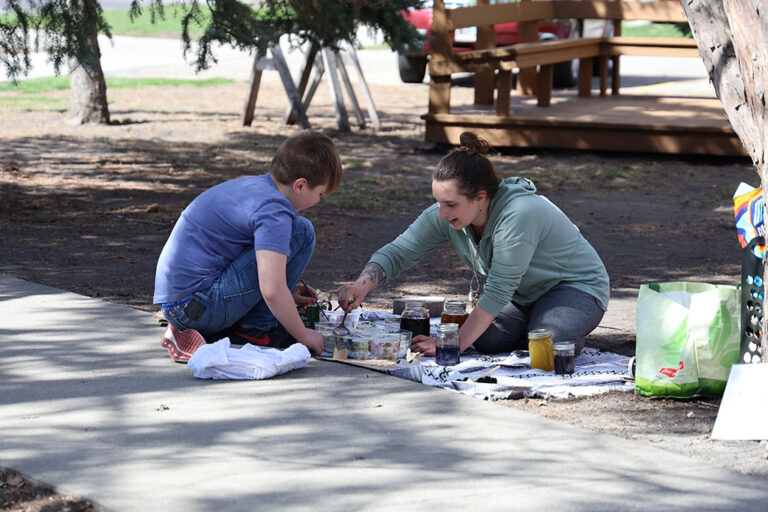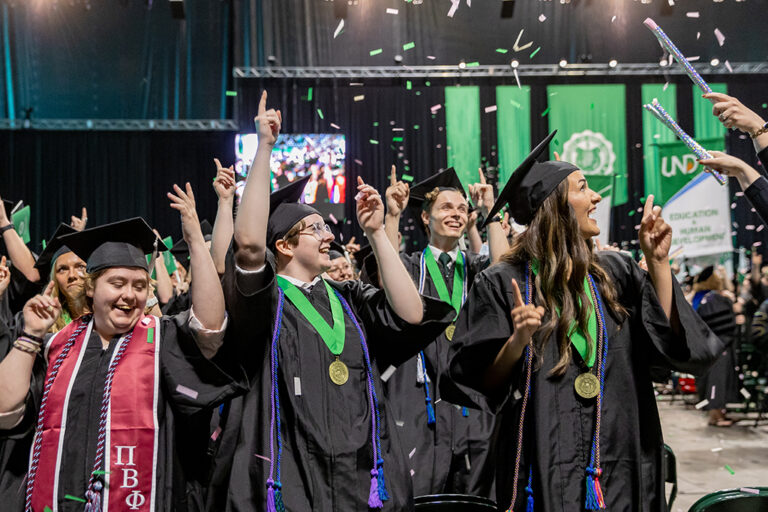Dressage champion has no time for horsing around
Aspiring Olympian balances heavy demands of sport, study with UND’s flexible Self-Paced Enroll Anytime program

Both sports take place in an arena under the watchful eye of nail-biting spectators. Both include colorful commentary from the sidelines. And both require exceptional teamwork, agility and grace.
UND fans might be able to easily name the game played by the Lamoureux twins of Olympic gold-medal hockey fame, but far fewer likely know anything about UND’s newest world-class athlete or her sport, which made its original Olympic debut in 680 B.C.
Online Social Science major and four-time gold Spanish champion Natalia Bacariza of Wellington, Fla., isn’t known for her expert stick handling or puck control. But she sure can handle the reins and control her composure well enough to persuade a 1,200-pound horse to “dance” on cue and in step with the music.
UND Today recently met up with Bacariza — via Zoom connection to Belgium — to learn more about the demanding sport of dressage and to hear how UND is helping the equestrian standout achieve her dreams.

But first … what is dressage, anyway?
Bacariza admits the very beautiful, but equally complicated sport of harmonious horsemanship often is difficult for “horse world” outsiders to understand. But she brings it into focus by drawing similarities to yet another Olympic sport that’s more common in the Upper Midwest.
“You might say dressage is kind of like figure skating, in a way,” Bacariza said. “People think it almost looks like we’re dancing with horses in how we must do a certain number of precision skills and exercises inside the ring.”
Multiday competitions include both team and individual events, as well as more elaborate freestyle performances, in which riders create their own fluid routines.
“In freestyle, you can organize your own list of exercises however you want,” Bacariza said. “But the more difficult you make the routine and the better you and your horse perform, the more points you can get.”
And just like figure skating, competitors earn a composite score that’s determined by averaging the scores of multiple judges — 100 being the highest possible score in the case of dressage.
“I believe the closest anyone has gotten is a 94, and I think that was in the Olympics,” Bacariza said. “Your highest marks are usually in freestyle because then you’re judged not just on the technical skills but also the artistic, the degree of difficulty, the choreography and the music interpretation — all of that counts.”
Bacariza, who recently advanced to the second-highest level of dressage — just one step away from the Olympic-qualifying Grand Prix — said it can take riders and their horses hours of daily practice over many years to perfect some of the most difficult moves. For example, the “piaffe” — meaning “on the spot” trot in place — is a stunning feat of strength and balance as the horse must raise and lower alternating diagonal pairs of legs while remaining relatively in place.
If you can imagine a horse doing a four-legged version of Michael Jackson’s “Moonwalk,” you’ll get the picture. And that’s just one intricate movement in a series of many.
There’s also the mystifying “leg yield,” or sideways scissor step, the very graceful and cadenced “passage” and the fascinating “flying change,” when the horse must alter its lead leg and reorder all its other legs on demand and in midair. Let’s just say there’s no such thing as a one-trick pony in dressage. See for yourself by watching Bacariza and her horses in action on YouTube.

A lifetime with horses
Even with a well-trained horse with a “good head,” Bacariza says it takes an incredible amount of dedication for riders to succeed in dressage. Many riders begin training when they’re very young.
Born in Madrid, where her mother once raised purebred Spanish horses, Bacariza had the advantage of being around horses her entire life. She recalled the ubiquitous horse family photo showing her father holding her atop a horse even before she could walk.
When she was 8, the family moved to Wellington — an American mecca for the sport — where Bacariza attended Palm Beach International Academy.
The private K-12 school with a separate college track caters to not only global equestrians but also all sorts of other students who require highly individualized and flexible learning plans. Among them are competitive ice skaters, polo and tennis athletes — and yes, even hockey players.
At 22, Bacariza has been taking college courses for a while now. These days, she’s taking up to four courses while also competing with up to five horses during both Wellington’s peak competitive dressage season — which lasts from January to April — and the international dressage circuit, which gears up as the American season winds down.
That’s why Bacariza’s family packs up, horses and all, each May. They return to Europe (the horses travel via cargo plane), where Bacariza competes for Spain in contests that bounce between Germany, Belgium and Holland.
“For me, my horses are like children. I love them, and it’s hard to even pick a favorite,” she says. “Of course, I would like to make a living in the horse world, and even though dressage is safe, you just never know when you can have an injury. So, it’s always good to have a Plan B for something else that you really enjoy.”
And for Bacariza, Plan B was to earn her UND bachelor’s degree in Social Science, along with a minor in Psychology.

The path to UND
So how does someone with triple citizenship in Spain, France and the United States come to enroll at a school she’s never heard of in a faraway state she’s never set foot in?
The answer is clear, Bacariza said. It’s because she found almost … well … unbridled freedom and flexibility with UND’s 100 percent Self-Paced Enroll Anytime online degree programs. With nine months to complete each course, Bacariza, and others like her, can live anywhere in the world while juggling the same workload as a traditional semester course. The only difference is that each student is able to set their own pace and their own schedule.
“No matter where I am, I have to focus on my horses,” Bacariza said. “I couldn’t do both school and horses properly without UND. It would be impossible for me.”
To illustrate that point, Bacariza says she has friends who’ve struggled while trying to balance “regular” online classes with the high demands of training, travel and competitions.
“They sometimes had to get up at 3 a.m. just to take a test because of the time difference,” she said.
With UND’s self-paced courses, Bacariza says she is the one who decides when she will turn in her assignments and take her exams.
“There’s already so much stress from the horse world. If I had to worry about school on top of that, I think I would die of a stomach ulcer,” Bacariza said with a laugh.
It was Debby Laznik, an academic director and also director of the University at Palm Beach International Academy, who first introduced Bacariza to UND.
“We work with a variety of accredited programs, but UND is the only one I’ve discovered so far that actually allows you to do your entire degree on what we call a completely asynchronous basis,” Laznik said. “Many other online colleges have individual courses that may say they’re fully asynchronous, but once you declare your degree and get to the upper-level courses, almost everything is semester-based.”
And that simply doesn’t work for students who travel and compete all over the world, she said.
“There might be two months during the (usual academic) year when they really can’t do academic things at all, so having hard start and finish dates is really difficult,” Laznik said. “What’s wonderful about UND’s program is that it really does give students the flexibility to complete their entire degree on that asynchronous basis, which makes a very big difference.”
Without that option, Laznik said, some students likely would delay college enrollment or choose not to pursue a college degree at all.
One-on-one advisor support

In addition to the excellent instruction students receive, Laznik says UND stands out for a few other important reasons — one being its large number of course options, as well as its attentive evaluation and acceptance of transfer credits.
“We feel that the service our students have gotten at UND has been nothing short of terrific,” she said. “The student advising is really personalized. We just don’t feel like some of the other universities we work with offer that same level of one-on-one support.”
Bacariza seconded that, specifically praising her own academic advisor, Angela Cary, from UND’s College of Arts & Sciences.
“Angela is a great advisor. She really focuses on making any situation less stressful for me,” Bacariza said. “She knows my goal is to finish as quickly as possible, and she’s good at helping me find the classes that will work best for me. It’s all been really, really good, and I haven’t had any issues with any of my online professors. If I ever have a question, I can just send an email and they always get back to me within a day or two.”
Cary says that Bacariza’s Social Science degree is particularly flexible for another reason, too. Students are able to select courses from as many as 10 different departments, and those credits often can be used toward another minor or certificate — meaning students get even more bang for their buck.
UND also has really amped up its advisor/advisee game plan in recent years.
“Students at other colleges might not get the advantage of having a professional academic advisor designated to work with them throughout their program,” Cary said. “UND students don’t get tossed around to different advisors depending on what time of day they call. Natalia knows she’s my gal, and I’m her gal, too. If she has a question about her schedule, her classes, any credit requirements, I’m her point person to help her through it.”
And Cary believes that strong relationship has played a crucial role in Bacariza’s success.
“Even if students don’t feel they have a lot of other contacts on campus, they know their advisor is only a phone call or Zoom call away. They have that dedicated person they can rely on for all sorts of questions — if they want to know more about campus or career resources, internships, anything.
“The real advantage of choosing UND is that we are definitely here to serve our students in whatever way works best for them.”
And at any moment, whether what’s best for Bacariza is getting back to the barn or the books, UND is helping her to lead and succeed.
>> IF YOU WANT TO LEARN MORE: Check out UND’s Self-Paced Enroll Anytime programs. Catherine Olson is SPEA coordinator.
>> QUESTIONS OR COMMENTS about the UND LEADS Strategic Plan? Your thoughts are welcome! Please contact Angie Carpenter, UND’s director of Special Student Populations, and/or Ryan Zerr, associate vice president for Strategy & Implementation, the co-chairs of the UND LEADS Implementation Committee.
You also may offer your thoughts by visiting the UND LEADS Strategic Plan home page and clicking on the “Provide your feedback” link that you’ll find there.
Thank you for your support of the UND LEADS Strategic Plan!



